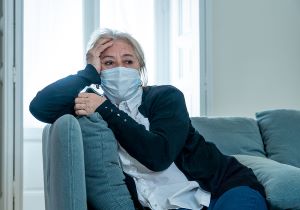February 16, 2021
by Patricia Tomasi
 A new study published the Journal of Preventative Medicine looked at psychological distress in the United States before and during the COVID-19 pandemic. This is the first longitudinal study of psychological distress during the pandemic in a nationally representative sample of U.S. adults. According to the Centers for Disease Control and Prevention, serious psychological distress includes mental health problems severe enough to require treatment and cause moderate to serious impairment in one’s daily life in the areas of schooling, social relationships, and work environments.
A new study published the Journal of Preventative Medicine looked at psychological distress in the United States before and during the COVID-19 pandemic. This is the first longitudinal study of psychological distress during the pandemic in a nationally representative sample of U.S. adults. According to the Centers for Disease Control and Prevention, serious psychological distress includes mental health problems severe enough to require treatment and cause moderate to serious impairment in one’s daily life in the areas of schooling, social relationships, and work environments.
“This study is about serious psychological distress during the COVID-19 pandemic,” study author Joshua Breslau told us. “We wanted to know the prevalence of serious psychological distress and the relationship of serious psychological distress during the pandemic with serious psychological distress prior to the pandemic. To what extent does pre-COVID-19 serious psychological distress predict serious psychological distress during COVID-19?”
A survey done over the period of 2013-2019 of U.S. adults showing serious psychological distress found that 3.4 per cent of adults aged 18 and over had serious psychological distress and that women were more likely to suffer from it than men. The National Health Interview survey also found that the higher the income of a person, the less likelihood they were to suffer from serous psychological distress. Those suffering from serious psychological distress were more likely to be uninsured, have difficulties with activities of daily living, have chronic obstructive pulmonary disease, heart disease, and diabetes.
The stress from the COVID-19 pandemic looks to be harming people mentally and adding to the cases of adults suffering from serious psychological distress. There have been studies of distress during COVID-19 that have found high levels in the general population, but none have had pre-COVID-19 comparisons on the same individuals. Breslau and researchers thought this would be an important contribution.
“We thought that pre-COVID-19 serious psychological distress would be strongly related to serious psychological distress during COVID-19 because psychiatric disorders are long-term chronic conditions with intermittent acute episodes that can be brought on by social stressors,” Breslau told us. “We also expected people with low income and minority race/ethnicity to be more likely to have elevated serious psychological distress during COVID-19 relative to their pre-COVID-19 serious psychological distress.”
Over 485,000 have died of COVID-19 to date and more than 27 million people in the U.S. have been infected with COVID-19. Worldwide, there are over 110,000,000 current cases, and over 2,400,000 people have died of the coronavirus. Over 84,000,000 have recovered. The virus has affected 219 countries and territories.
Researchers surveyed a representative sample of the U.S. population in May of 2020. They had previously interviewed these individuals in February of 2019. They compared their responses in 2020 to their responses in 2019.
Researchers found that people with serious psychological distress in the 2019 survey were 15 times more likely to have serious psychological distress during COVID-19 than people with low/no psychological distress in the 2019 survey. Elevated distress during COVID-19, relative to 2019, was associated with being under 60 years of age, below median income and Hispanic ethnicity.
“This is what we expected, though the strength of the relationship between serious psychological distress over time was surprisingly strong,” Breslau told us. “Clinicians should focus attention on people with pre-existing mental health conditions. The long term course of serious psychological distress should be followed in subsequent studies.”
About the Author
 Patricia Tomasi
Patricia Tomasi
Patricia Tomasi is a mom, maternal mental health advocate, journalist, and speaker. She writes regularly for the Huffington Post Canada, focusing primarily on maternal mental health after suffering from severe postpartum anxiety twice. You can find her Huffington Post biography here. Patricia is also a Patient Expert Advisor for the North American-based, Maternal Mental Health Research Collective and is the founder of the online peer support group - Facebook Postpartum Depression & Anxiety Support Group - with over 1500 members worldwide. Blog: www.patriciatomasiblog.wordpress.com
Email: tomasi.patricia@gmail.com